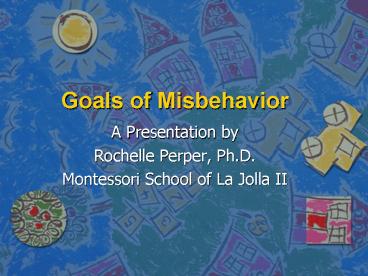Goals of Misbehavior PowerPoint PPT Presentation
1 / 20
Title: Goals of Misbehavior
1
Goals of Misbehavior
- A Presentation by
- Rochelle Perper, Ph.D.
- Montessori School of La Jolla II
2
Goals of Misbehavior
- Behaving normally out of a specific need
- Mode of communication
- Reinforcing the positive
3
Four Main Goals Children are attempting to
accomplish through misbehavior
- Attention
- Power
- Revenge
- Inadequacy
4
Goal 1 AttentionI need to be noticed
- Based on need for positive recognition
- Negative attention is better than no attention
- The Silver Lining
- Your child wants to have a relationship with you
5
Examples of Attention-Seeking Behaviors
- Biting
- Whining
- Watch me now!
- Seeks constant parent contact
- Not doing something that they should be doing
- Child operates on slow, slower, and slowest speeds
6
Parents Reaction to Attention
- Annoyance
- Tendency to remind the child to stop
- When you give attention to negative behavior, the
child is being reinforced for misbehavior - Childs Response to Parents Reaction
- Temporarily stops misbehavior, and later resumes
behavior or disrupts in similar or other way
7
AttentionAlternatives for Parents
- Ignore the Behavior
- Give attention for positive behavior when child
is not making a bid for it - Redirect child to more appropriate activity
- Set aside some time each day to give full
attention to child - Model to your child how to ask directly for
attention when needed
8
Goal 2 PowerYou cant make me
- Based on need for personal independence
- Child feels important when he or she is the boss
- Accompanied by secondary goal of getting out of
doing something or getting something that he or
she wants - The Silver Lining
- Your child exhibits leadership potential,
assertiveness, and independent thinking
9
Examples of Behaviors for Power
- No!
- Temper tantrums
- Resists directions
- Quiet noncompliance your child does his or her
own thing
10
Parents Reaction to Power
- Anger
- Exasperation
- Tendency to fight or give in
- Childs Response to Parents Reaction
- Intensifies misbehavior
- Submits with defiance
11
Power Alternatives for Parents
- Give child legitimate power with limited choices
and jointed decisions and discipline - Allow for flexibility in when, where, or how
- Delegate responsibility so your child feels a
sense of responsible power - Avoid and defuse confrontation by stating
feelings and The Rule is - Dont give in just to make peace
- Let consequences occur
12
Goal 3 RevengeYou dont love me
- Based on need for safety and security
- If a child feels unlovable, hurt, uncomfortable
or scared, he or she may want to even the score - The Silver Lining
- Your child shows a spark of life by trying to
protect himself from further hurt
13
Examples of Behaviors for Revenge
- Name-calling
- I hate you
- I dont love you anymore
- Hits parent
- Child is sullen and withdrawn
- Child may refuse overtures of friendship
14
Parents Reaction to Revenge
- Deep hurt
- Tendency to want to get even
- Childs Response to Parents Reaction
- Seeks more revenge by intensifying misbehavior
- Choosing another misbehavior
15
Revenge Alternative for Parents
- Avoid feeling emotionally hurt and punishing your
child - Statements that empower parents
- Highlight your childs strengths
- Reflect what it is you think your child might be
feeling - Build trust and respect through caring
relationships with your child - Model for your child how to express hurt and
hostility appropriately and invite your child to
talk when he or she is upset
16
Goal 4 Inadequacy I cant
- Based on need for success
- Child may give up on succeeding because he or she
feels discouraged - By misbehaving, a child avoids situations with
high expectations - The Silver Lining
- Your child has a strong desire to accomplish
goals well
17
Examples of Behaviors for Inadequacy
- Whines or cries
- I cant do it
- Can you do it?
- Child may throw tantrum when pressure to succeed
becomes too intense - Procrastination, or failure to complete projects
18
Parent Reactions to Inadequacy
- Despair
- Helplessness
- Tendency to agree with the child that nothing can
be done - Childs Response to Parents Reaction
- Responds passively or fails to respond
- Refuses to try and shows no improvement
19
InadequacyAlternatives for Parents
- Encourage any efforts or attempts to improve
- Do not pity
- Resist urge to feel helpless have faith that
your child can handle the problem - Mistakes are okay!
20
Thank you.
- You can learn many things from children. How
much patience you have, for instance. Franklin
P. Jones

